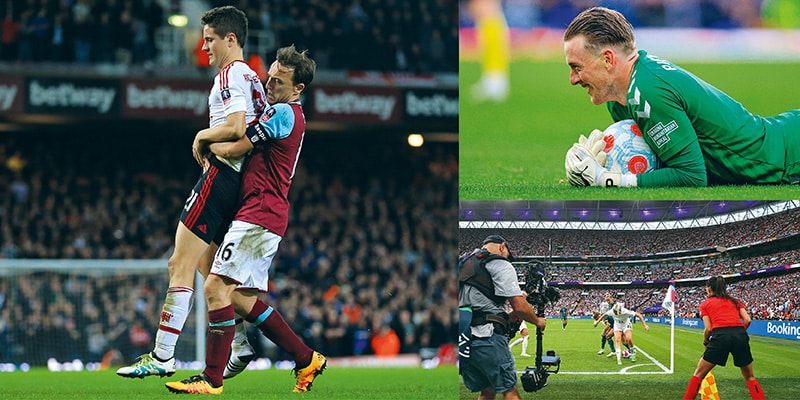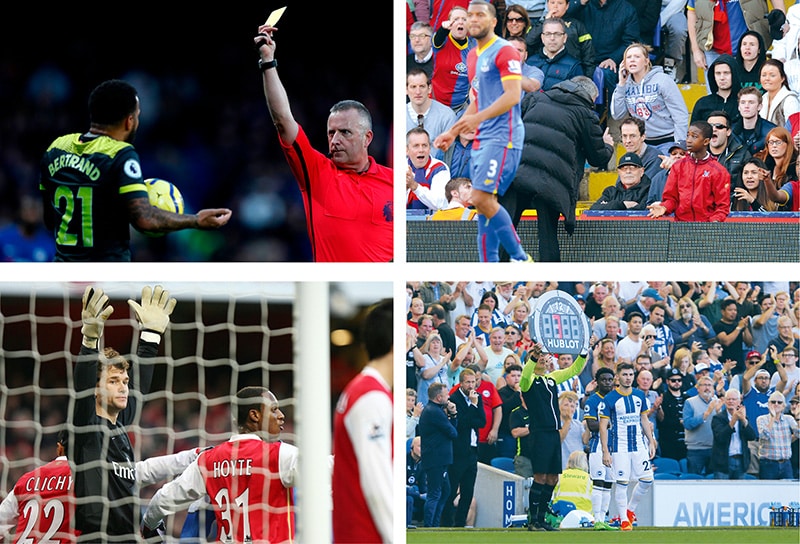
Mark Noble carries Ander Herrera off the pitch; Jordan Pickford performs his trademark flop; Alessia Russo keeps the ball in the corner as England hang on to a 2-1 lead in the Euro 2022 final. Offside, Alamy, Getty
Running down seconds during a match is no longer simply a case of taking the ball to the corner, with the famous Pickford Flop one of many modern methods
By Cameron Carter
26 September, 2022
As a pastime, or indeed lifestyle, time wasting is undervalued. To do nothing takes real imagination; to produce nothing requires a strong moral core. The idle person does not, among other things, perform unnecessary cosmetic surgery or release an album of swing covers. The most courageous way of experiencing time is through inaction – to remain quite still and feel the minutes crawl across the face. Time wasting in football, however, is the preserve of knaves and shysters.
The trouble is, while time wasting in everyday life is viewed by the capitalist orthodoxy as weak and suspicious, in football it imparts to its practitioners a level of sophistication. The deliberate act of slowing the game down or breaking the game up, when ahead, is identified as the opposite of naivety. It has been given a new name, “game management”, elevating low-cunning sabotage into something worthy of a college diploma. Good game management is now understood to be a quality that a successful side must possess. The dictionary definition of time wasting – to produce nothing of benefit or expend no energy – does not apply to its application in football. Significant energy is expended in keeping the ball quiet and what could be more important than three points?
Taking the ball to the corner flag is football’s equivalent of the medieval ceremony of leading the Devil away from the village, into the wilderness. For slow-witted insolence, the corner flag time waster occupies a position somewhere between a cow in the road and anyone using the crying-with-laughter emoji on social media by way of refuting an opposing point of view. A diagram, shown by the BBC, of the ball’s position in the last ten minutes of the Euro 2022 final is a design homage to this tried and tested practice. The throw-in also has a long chapter in this story. Strenuously attempting to throw the ball back into play before finally accepting defeat and leaving it to a team-mate has had to be added to the laws of the game as a yellow card offence because it happened so often. With throw-ins, everyone can join in the fun – the home team’s ballboy delaying the handover, or the crowd batting the ball beyond the reach of the frantic opposition player, close to tears of impotent rage. Feigning or exaggerating injury, though, is where most time damage is done. When Mark Noble picked up the malingering Ander Herrera and carried him off the pitch, it was a moment to savour for ball-in-play lovers everywhere. Herrera’s fascinated acquiescence, as he was lugged to the touchline like a sack of coal, played its part in making the scene so memorable.

Clockwise: Ryan Bertrand is booked for time wasting in the 29th minute; José Mourinho tells off a Crystal Palace ballboy in 2014; Brighton make a 93rd-minute double substitution in their 5-2 win over Leicester; Jens Lehmann keeps goal for Arsenal against Wigan in 2007. Colorsport, Getty Images (3)
Just as there are artists to be found in the most unpromising of environments – we think of war poets and the keyboard player in Inspiral Carpets – so there are those who produce great individual work in the despicable pursuit of running down the clock. Jens Lehmann, one of the early martyrs of time wasting, was booked in a 2007 game for his unique variant on retrieving the ball from behind the goal. Lehmann, while impersonating a man in a hurry to take a goal-kick, contrived to toss the ball into an advertising hoarding, the ball rebounding behind him and forcing him, in a creditable facsimile of innocent confusion, to retrace his steps. In another exquisite miniature, Ryan Giggs and David Beckham were admonished by the referee for standing companionably over a corner kick together as vital seconds ticked away. Both pointed to the ball, outside of the “D”, which Giggs had feathered there several seconds ago while no one was paying attention. It is this kind of vision that raises a grubby, reprehensible act into something that everyone can enjoy. Because, in the right hands, time wasting approaches a central concept of the Dadaist manifesto. By going out onto a football pitch and trying not to play football, the creative time waster demonstrates the absurdity of attempting the meaningful within an activity that has no meaning.
Lehmann was piloting his own work in a field in which his fellow goalkeepers have always shown a special aptitude, whether pausing to kick mud off the boots on the post prior to a goal-kick, the 20 seconds of holding onto the ball while waving team-mates forward, or, with the introduction of the four steps rule, exploiting the loophole that three steps followed by placing the ball on the ground and picking it up again was a tease impossible to punish. Reading through amendments to the four-step rule gives an idea of how it was immediately and enthusiastically bent to breaking point by goalkeepers. More recently, we have the Pickford Flop, an emotional collapse onto the ball in an attempt to convince referees with a strong sense of theatre that this, dramatically speaking, would make the perfect ending.
The most irksome aspect of this racket – the late double-substitutions, taking it in turns to go down with cramp, delaying free-kicks by pointing at some non-existent impediment to restarting the game – is that all are acted out with a vaudevillian commitment that suggests we cannot guess the deeper motive of the perpetrator. Time wasting has been assimilated into football as an inevitable part of the game, just as signs like “2022 Walking Festival” appear now in our towns unquestioned. None of this ham-fisted subterfuge would matter, though, if match officials kept track of time. In practice, the ball is actually in play for only 45-55 minutes of most games, and yet routinely injury time is kept to three minutes, or a little less if the ball happens to be in the air. As the Stoic philosopher Seneca wrote, from memory: “It is not that we have a short space of time, but that we waste much of it detouring to shake hands with the referee after being substituted.”
This article first appeared in WSC 424, September 2022. Subscribers get free access to the complete WSC digital archive
Want to see your writing published in WSC? Take a look at our pitching guide and get in touch
Tags: Jordan Pickford, Referees, Time Wasting
